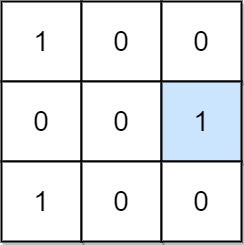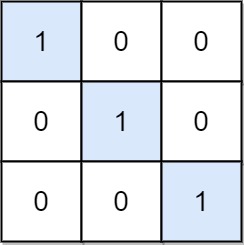Given an m x n binary matrix mat, return the number of special positions in mat.
A position (i, j) is called special if mat[i][j] == 1 and all other elements in row i and column j are 0 (rows and columns are 0-indexed).
Example 1:
Input: mat = [[1,0,0],[0,0,1],[1,0,0]]
Output: 1
Explanation: (1, 2) is a special position because mat[1][2] == 1 and all other elements in row 1 and column 2 are 0.
Example 2:
Input: mat = [[1,0,0],[0,1,0],[0,0,1]]
Output: 3
Explanation: (0, 0), (1, 1) and (2, 2) are special positions.
Solution
class Solution:
def numSpecial(self, mat: List[List[int]]) -> int:
cnt = 0
rows = len(mat)
cols = len(mat[0])
row_sum = list()
col_sum = list()
for r in mat:
row_sum.append(sum(r))
for c in zip(*mat):
col_sum.append(sum(c))
for r in range(rows):
for c in range(cols):
if mat[r][c] == 1 and row_sum[r] == 1 and col_sum[c] == 1:
cnt += 1
return cnt
